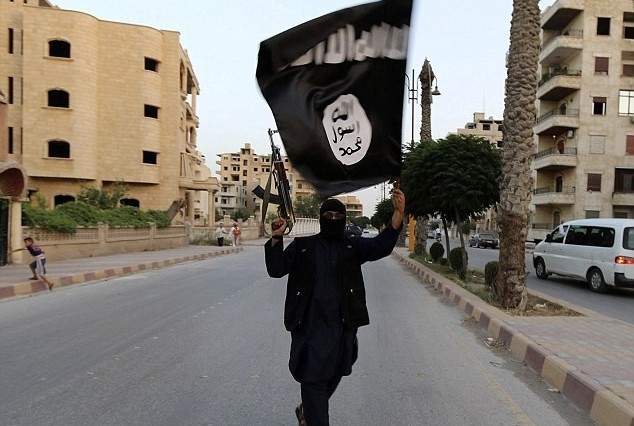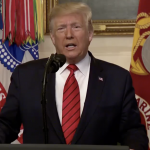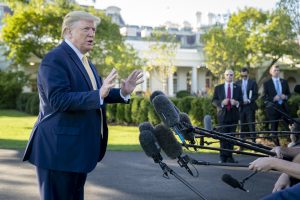by Derek Davison
One of the unintended consequences of the decision to extend the international talks on Iran’s nuclear program is the growing number of neoconservative calls for even more pressure on Iran. So it was on July 28 that the Gemunder Center Iran Task Force, a creation of the Jewish Institute for National Security Affairs (JINSA), hosted a panel discussion, “The Elusive Final Deal with Iran: Developments and Options Going Forward,” the participants of which all agreed on the need to “pressure” Iran now, and presumably forever, or at least until a new regime takes over in Tehran (which will be any day now, surely).
The substance of the discussion closely mirrored JINSA’s July 17 report, “Improving the Prospects for an Acceptable Final Deal with Iran,” which also focused on “pressure.” The panel repeatedly made the case for more pressure, which highlighted the shifting goalposts that have marked the neocon approach to the talks between Iran and the P5+1 (US, UK, France, China, and Russia plus Germany) since they began.
America and its allies were supposed to pressure Iran into negotiating and bringing its nuclear program into compliance with international expectations. Now that Iran is (again) negotiating and is in compliance, the calls for increasing pressure continue from neoconservative think tanks and certain actors on Capitol Hill.
When Ray Takeyh of the Council on Foreign Relations talks about the importance of increasing pressure on Iran while “giving them a way out,” it’s not quite clear how that differs from what has already happened up until this point. Now American pressure is supposed to leverage not just Iran’s participation in the talks, not only its compliance with its NPT obligations, but also inspire Iranian capitulation to the agenda of American hawks. Iran’s failure to capitulate is proof positive that it hasn’t been pressured enough. Either the Iran hawks aren’t getting the hang of this “negotiating” thing or they consider “pressuring” Iran the end, not the means.
So what should pressure amount to when it comes to Iran and the nuclear talks? According to the JINSA report, Iran “respects only strength” (that really is a direct quote), so naturally a “credible” military threat is required. This requires more public threats of a military response, more public pledges to defend America’s regional allies from alleged Iranian aggression, more public tests of US “bunker buster” weaponry like the Massive Ordinance Penetrator (MOP), and more weapons sales, including MOPs, to Israel.
The panel also heavily emphasized the idea that America must “compete” with Iran regionally, “interdicting Iranian actions” as Ambassador Dennis Ross put it. This would presumably ratchet up the “pressure” on Iran. But the chaotic state of affairs throughout the Middle East right now makes it almost impossible for the US to adopt an across-the-board policy of opposing Iranian action everywhere. There are three regional flashpoints where Iran is currently active: Gaza, where it may be strengthening its support for Hamas; Syria, where it supports Bashar al-Assad against the rebel factions trying to unseat him; and Iraq, where it supports the Shia-led government (even if its support for Nouri al-Maliki is waning) and opposes the Islamic State (IS).
In Gaza, the US can and will oppose Iranian activity that might harm Israeli interests, but in Syria the picture becomes muddled, since America supports some of the rebels fighting Assad (the Free Syrian Army) but opposes others (the al-Qaeda affiliated al-Nusra Front and IS, also opposed by Iran). Meanwhile, in Iraq, for all practical purposes the US and Iran are on the same side, backing Maliki (or at least Baghdad) against IS and the Baathist Naqshbandi Army, though Washington has emphasized the need for a policy of reconciliation between Baghdad and Iraq’s disaffected Sunnis. JINSA’s report notes, in something of an understatement, that “the United States has been reticent to counter Iranian attempts to bolster its Shiite allies” in Syria and Iraq. Well, there’s a reason for that; doing so would materially damage US interests in Iraq and would risk the rise of a greater threat in Syria.
The panelists disagreed somewhat on the ideal length of a comprehensive deal. Ross, somewhat more realistically than his fellow panelists, suggested that an acceptable deal would sunset after 20 years, whereas former George W. Bush officials Stephen Rademaker and Eric Edelman seemed to be unhappy with a deal that would ever sunset. Rademaker specifically objects to language in the JPOA indicating that at the conclusion of a comprehensive solution, “the Iranian nuclear programme will be treated in the same manner as that of any non-nuclear weapon state party to the NPT.” While this would still leave Iran subject to Article III of the Nuclear Non-Proliferation Treaty, specifically its requirement that states comply with safeguards negotiated with the International Atomic Energy Agency (IAEA) to prevent the development of a nuclear weapon, Rademaker insists that Iran should remain under the terms of a comprehensive deal indefinitely. This is certainly a non-starter for the Iranians, who have been clear that they will only accept a deal under which Iran will ultimately be treated like any other NPT-signatory, but maybe they’re only insisting on that point because the US hasn’t “pressured” them enough yet.






Interesting post. One should ask the question to the neocons, why? Looking over the past since the first gulf war, perhaps even earlier, just what has your advice produced? The M.E. isn’t looking all that great, the image the U.S. has in the region from all their so-called expertise is wanting, to say the least. It’s time to marginalize these hawks before someone uses a nuclear bomb, be it the U.S.A. or Israel, probably Israel. If the neocons had their way, I’m sure that they would adopt the Israeli method used with he Palestinians, especially in Gaza. Just whose security are they really concerned with? The U.S.A.s who sits 8,000 miles away, or Israels, who’s the center of all the present controversial action in the M.E. today! Of course, there’s also the armament[s] that are paid for by the over burdened American taxpayer.
At some point, someone decided that chaos in the middle east is better than stability, dealing with one of two despots is easier than dealing with fluid and unpredictable democracies, and buying oil cheap and selling weapons is the top priority. I read Ray Takyeh’s article in Foreign Affairs magazine. Shame on Ray for writing such a misleading article full of holes and even more shame to FA magazine for publishing it. I guess Kermit Roosevelt Jr. was a fantasy writer as far as Mr. Takyeh is concerned since all his work is introduced as over stated and fiction. It is convenient that Takyeh’s article comes 14 years after the death of Roosevelt Jr. since dead men do not fight back.
Libya, Syria, Iraq, Yemen, and Afghanistan are in total disarray. Egypt, Bahrain and Pakistan are on the verge and only a strong military and complete vacillation to the west are keeping them in place. Jordan is propped up by Israel and Saudi financing and the Saudis themselves are having deep second thought.
New players- Chaliphe of IS
Dennis Ross did his best to prevent Obama from improving relations with Iran. And Ross wants Israel to continue to grow the illegal colonies of Jews in the West Bank, even if it means endless war.
To make sense of this situation, one needs to appreciate that the real goal of the Israel Lobby in regard to Iran is to goad the U.S. into waging war on Iran. The non-existent Iran nuclear weapons program is only the political justification for that war, intended only for the ignorant. Netanyahu directly pushed for that war to begin in the lead-up to the 2012 elections in the U.S.
So equipped with that knowledge, one can see the Israel Lobby’s interim goal is to ensure that a negotiated agreement between the U.S. and Iran does not happen, since it would remove the excuse for war. Hence, the U.S. must — in the Israel Lobby’s view — be pushed into demanding conditions that Iran will not accept, placing the subject of war back on the front burner.
Why is Dennis Ross even allowed into any meeting regarding the Middle East? He certainly has shown that his “expertise” has led us to peace in the area..Wonder if the “they only respect strength” that was Bush’s culturally impotent belief came from Dennis.?